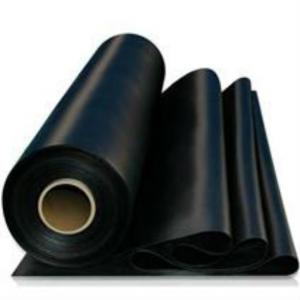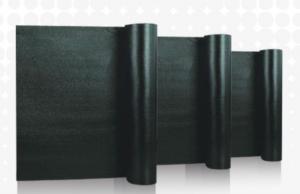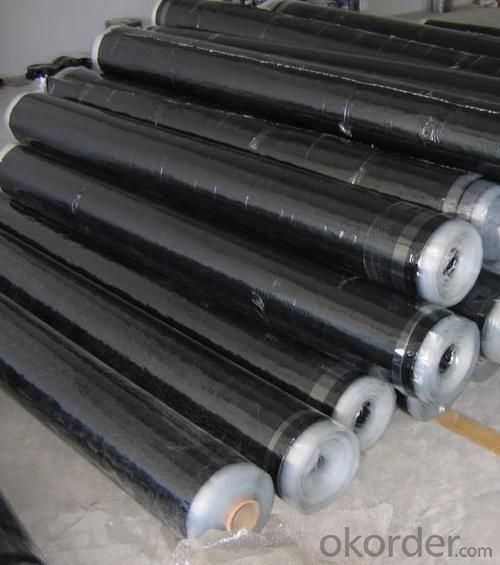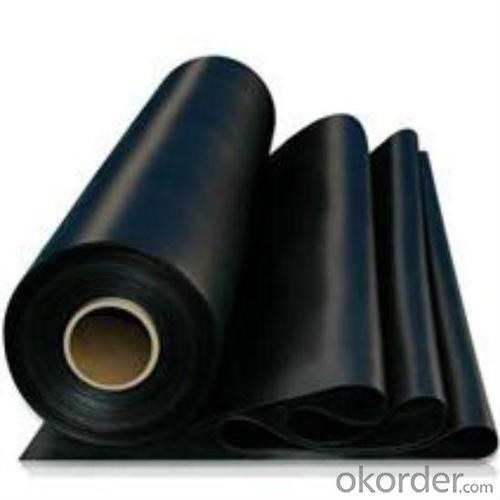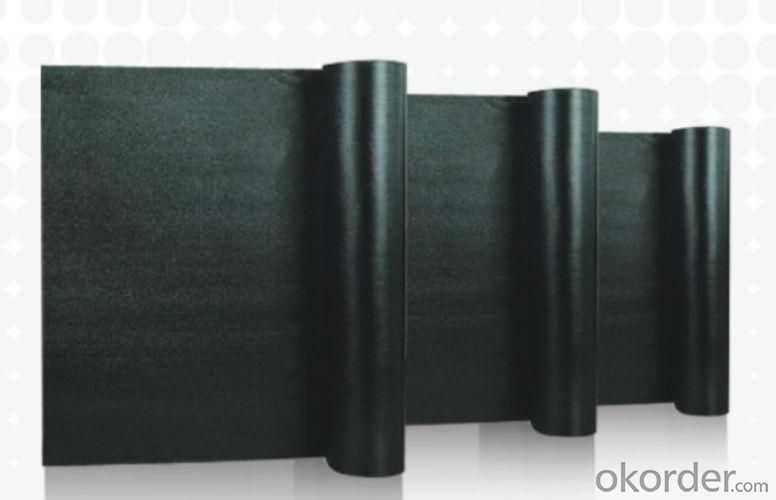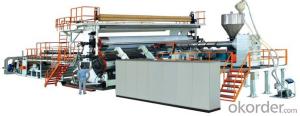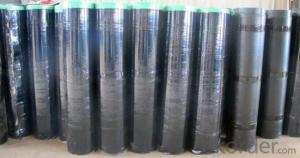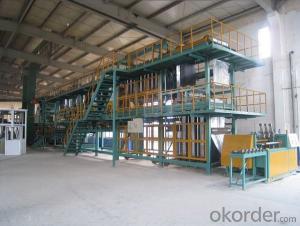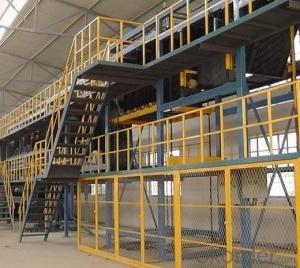APP Bitumen Waterproof Membrane
- Loading Port:
- China Main Port
- Payment Terms:
- TT or LC
- Min Order Qty:
- 2000 M2 m²
- Supply Capability:
- ONE WEEK PER CONTAINE m²/month
OKorder Service Pledge
OKorder Financial Service
You Might Also Like
Detailed Specification for APP Waterproofing Membrane:
|
Item |
APP/SBS modified bitumen waterproof membrane | ||||
|
Grade |
First |
Second | |||
|
Base |
PY |
G | |||
|
Cover |
PE |
S |
M |
Al | |
|
Thickness |
2/3/4mm | ||||
|
Color |
Black PE film |
Yellow/green/other Fine Sand |
Grey/Green/other MineralGrains/Flakes |
Aluminium Foil | |
|
Notes |
PY------Polyester Base G-------Glassfibre Base | ||||
SBS/APP modified bitumen waterproofing membrane is made by soaking the base in bitumen,or thermoplas ticityelastomer(such as styrene butadiene-SBS), or thermoplastics (such as atactic polypropylene-APP,APAO,APAL) modified bitumen, then covering double faces with elastomer(SBS) or thermoplastics( APP, APAO,APAL) modified bitumen, and last finiishing the upward face with fine sands, mineral slates(or grains) or polythene membrane ect, while downward face with fine sands or polythene membrane.
Pictures for APP Waterproof Membrane:
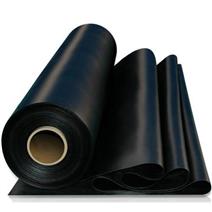
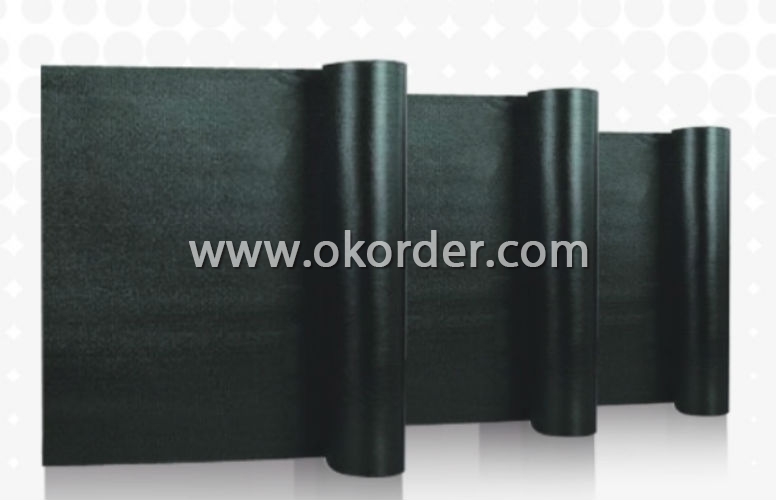
- Q: Can a waterproofing membrane be used on balconies and decks?
- Yes, a waterproofing membrane can be used on balconies and decks. Waterproofing membranes are specifically designed to provide a protective layer against water damage, making them an ideal solution for outdoor areas like balconies and decks that are exposed to rain, snow, and other moisture. By applying a waterproofing membrane, you can effectively prevent water penetration, enhance the durability of the surface, and extend the lifespan of your balcony or deck.
- Q: Are waterproofing membranes resistant to impact damage?
- Waterproofing membranes offer protection against water infiltration and typically resist impact damage to varying degrees. The level of impact resistance depends on the specific membrane type and quality. Generally, high-quality waterproofing membranes are designed to endure normal impacts and stresses that occur during installation and use. They are manufactured using durable materials, like modified bitumen, rubberized asphalt, or synthetic polymers, which enhance their strength and resilience. Although waterproofing membranes can withstand minor impact damage, they are not completely impervious to more significant impacts. Dropping heavy objects or sharp objects falling onto the membrane can potentially cause punctures or tears, compromising the integrity of the waterproofing system. This can result in water infiltration and potential structural issues. To enhance impact resistance, additional protective measures can be taken, such as installing a protective layer or using reinforced membranes. These extra layers or reinforcements provide an additional barrier against impact damage, ensuring the long-term performance and durability of the waterproofing system. In conclusion, while waterproofing membranes generally resist impact damage, it is crucial to handle them with care during installation and avoid unnecessary impacts that could potentially compromise their integrity.
- Q: Can waterproofing membranes be used on outdoor fountains?
- Indeed, outdoor fountains can benefit from the application of waterproofing membranes. The primary purpose of these membranes is to establish a protective shield that thwarts water infiltration, rendering them an excellent choice for safeguarding outdoor fountains against water-induced harm. Typically composed of water-resistant materials like rubber, PVC, or bitumen, these membranes effectively seal the fountain's structure. By applying a waterproofing membrane to an outdoor fountain, one can extend its longevity, avert leaks, and shield it from the elements.
- Q: Can a waterproofing membrane be installed by a DIYer?
- Yes, a waterproofing membrane can be installed by a DIYer. However, it is important to note that the installation process can be complex and requires careful attention to detail. It is crucial to thoroughly understand the manufacturer's instructions and guidelines before attempting the installation. Additionally, proper surface preparation is essential for a successful installation. This may involve cleaning, leveling, and priming the surface to ensure proper adhesion. It is also important to choose the correct membrane type and thickness that is suitable for the specific application. Furthermore, DIYers should have the necessary tools and equipment, such as a trowel or roller, to apply the membrane correctly. In some cases, specialized tools may be required, depending on the specific membrane and installation method. It is also important to consider safety precautions, such as wearing protective gear and working in a well-ventilated area. Some waterproofing membranes may require the use of hazardous chemicals, so it is crucial to follow all safety instructions provided by the manufacturer. If you are unsure about your ability to install a waterproofing membrane properly, it is advisable to consult with a professional contractor who specializes in waterproofing. They have the experience and expertise to ensure a proper installation that will effectively protect your property from water damage.
- Q: Can a waterproofing membrane be used on metal block surfaces?
- Yes, a waterproofing membrane can be used on metal block surfaces. Waterproofing membranes are designed to create a barrier against water and moisture, and they can be applied to a variety of surfaces, including metal. The membrane will adhere to the metal surface, creating a waterproof layer that helps prevent water infiltration and protect the metal from rusting or corrosion. However, it is important to ensure that the metal surface is clean, dry, and properly prepared before applying the waterproofing membrane to ensure proper adhesion and effectiveness. Additionally, it is recommended to consult with a professional or refer to the manufacturer's instructions for specific guidance on using a waterproofing membrane on metal block surfaces.
- Q: Are there any specific tools or equipment required for installing a waterproofing membrane?
- Yes, there are specific tools and equipment required for installing a waterproofing membrane. Some common tools include a trowel, utility knife, paint roller, brush, and caulking gun. Additionally, a heat gun or torch may be needed for certain types of membranes that require heat activation. It is important to follow the manufacturer's instructions and recommendations for the specific membrane being installed to ensure proper installation and effectiveness.
- Q: Are waterproofing membranes suitable for bridge abutments?
- Bridge abutments, the structures supporting the ends of a bridge, can benefit from the use of waterproofing membranes. Given their exposure to moisture and water, it is crucial to protect these structures. Waterproofing membranes serve as an effective barrier against water and moisture intrusion, making them an excellent solution for bridge abutments. These membranes, typically composed of materials like bitumen, PVC, or EPDM, possess high resistance to water penetration. Moreover, they offer additional protection against factors such as UV rays, chemicals, and temperature changes. By installing waterproofing membranes on bridge abutments, the risk of water damage, deterioration, and corrosion can be significantly reduced. Consequently, the bridge structure's durability and longevity are enhanced.
- Q: Can a waterproofing membrane be used on planter boxes?
- Yes, a waterproofing membrane can be used on planter boxes. A waterproofing membrane is typically used to prevent water from seeping through surfaces, and this can be beneficial for planter boxes as it helps to protect the wood or other materials from moisture damage. By applying a waterproofing membrane to the interior of the planter box, it creates a barrier that prevents water from penetrating the material and potentially causing rot or decay. This can extend the lifespan of the planter box and ensure that it remains in good condition for a longer period of time. Additionally, a waterproofing membrane can also help to retain moisture within the planter box, which can be beneficial for the plants or flowers that are being grown. Overall, using a waterproofing membrane on planter boxes can provide added protection and durability.
- Q: Can waterproofing membranes be used on below-grade parking structures?
- Yes, waterproofing membranes can be used on below-grade parking structures. In fact, they are commonly used to protect these structures from water infiltration and potential damage. Waterproofing membranes are designed to provide a barrier against water penetration, thus preventing moisture from seeping into the concrete and causing deterioration. These membranes can be applied to the below-grade walls and floors of parking structures to ensure their long-term durability and structural integrity. Additionally, waterproofing membranes can also help prevent the formation of mold and mildew, which can be a common issue in damp environments such as below-grade parking structures. Overall, using waterproofing membranes is highly recommended for below-grade parking structures to protect them from water damage and extend their lifespan.
- Q: Can a waterproofing membrane be used on vinyl surfaces?
- Yes, a waterproofing membrane can be used on vinyl surfaces. The membrane serves as a protective layer that prevents water from penetrating and damaging the vinyl material.
1. Manufacturer Overview
| Location | Beijing, China |
| Year Established | 1998 |
| Annual Output Value | Above US$ 30 Million |
| Main Markets | Mid East; Eastern Europe; North America; Southeast Asia |
| Company Certifications | ISO 9001 |
2. Manufacturer Certificates
| a) Certification Name | |
| Range | |
| Reference | |
| Validity Period |
3. Manufacturer Capability
| a) Trade Capacity | |
| Nearest Port | Tianjin |
| Export Percentage | 41% - 50% |
| No.of Employees in Trade Department | Above 50 People |
| Language Spoken: | English; Chinese |
| b) Factory Information | |
| Factory Size: | Above 600,000 square meters |
| No. of Production Lines | Above 10 |
| Contract Manufacturing | OEM Service Offered; Design Service Offered |
| Product Price Range | Negotiated |
Send your message to us
APP Bitumen Waterproof Membrane
- Loading Port:
- China Main Port
- Payment Terms:
- TT or LC
- Min Order Qty:
- 2000 M2 m²
- Supply Capability:
- ONE WEEK PER CONTAINE m²/month
OKorder Service Pledge
OKorder Financial Service
Similar products
Hot products
Hot Searches
Related keywords
